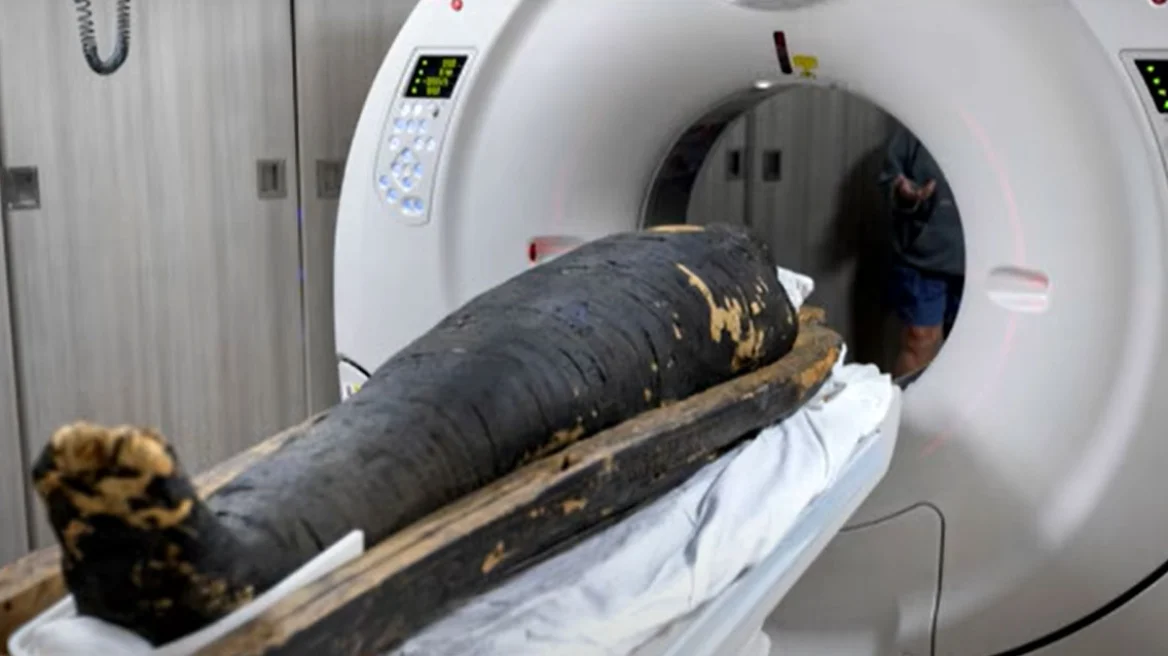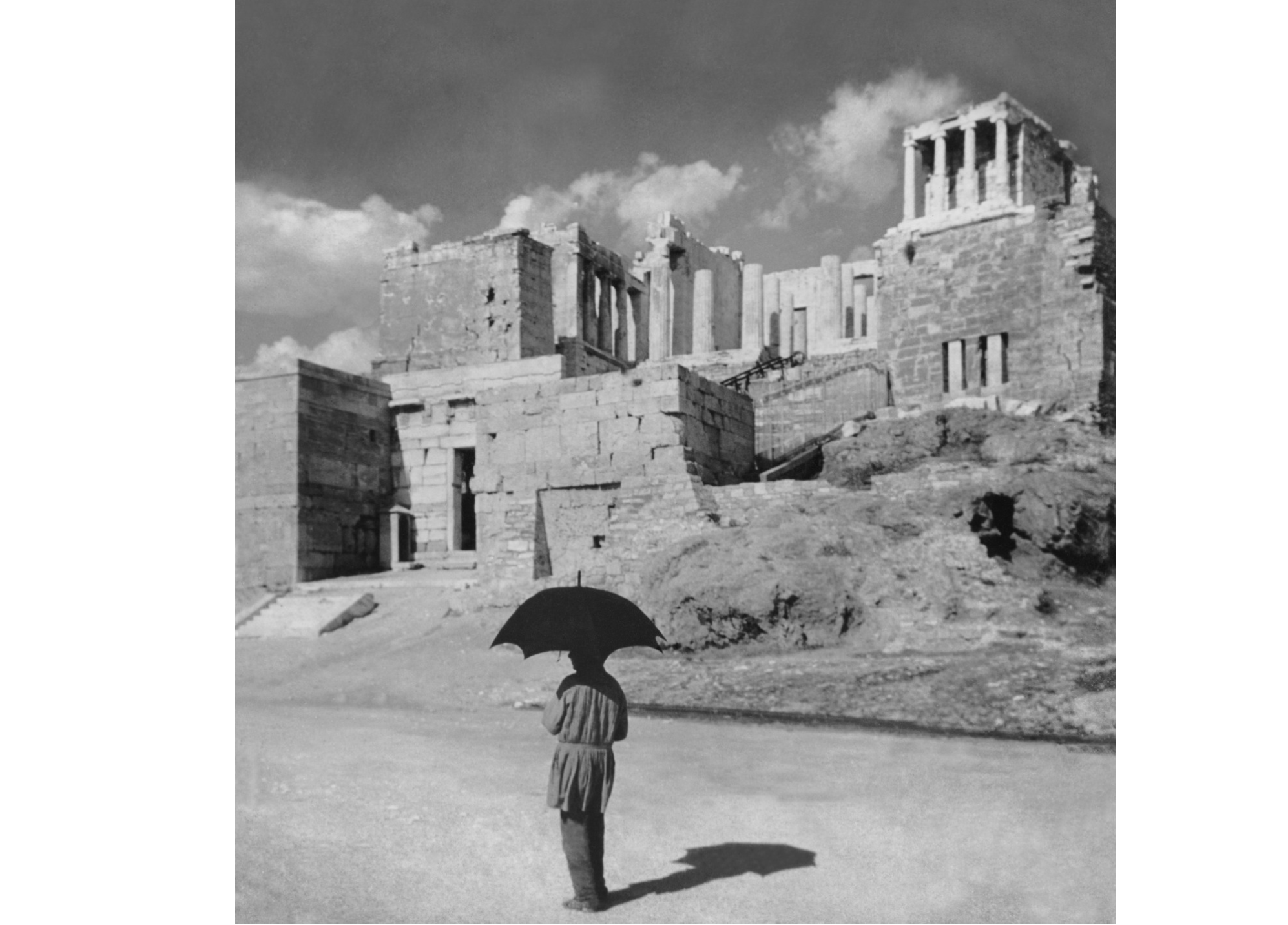With tears in her eyes, Daphne Simitis bids farewell to her husband and former prime minister. His daughters, followed by her, and placed white flowers on his grave.
Military honors are being paid to Kostas Simitis by the three detachments at the A’ Cemetery, along with the brass band.
The funeral of Kostas Simitis is being held with honors befitting a sitting prime minister. The Greek flag, which was covering the coffin, was removed according to protocol to allow for the burial.
The family members of the former prime minister, President of the Republic Katerina Sakellaropoulou, PASOK leader Nikos Androulakis, PASOK officials, and a large crowd are present at the site.
Applause and sounds from the military band accompany the body of Kostas Simitis to the A’ Cemetery.
Kostas Simitis will be laid to rest next to Andreas Papandreou and near Melina Mercouri, with honors to be rendered by guards from the three branches of the Armed Forces.

The procession passed outside the Parliament.
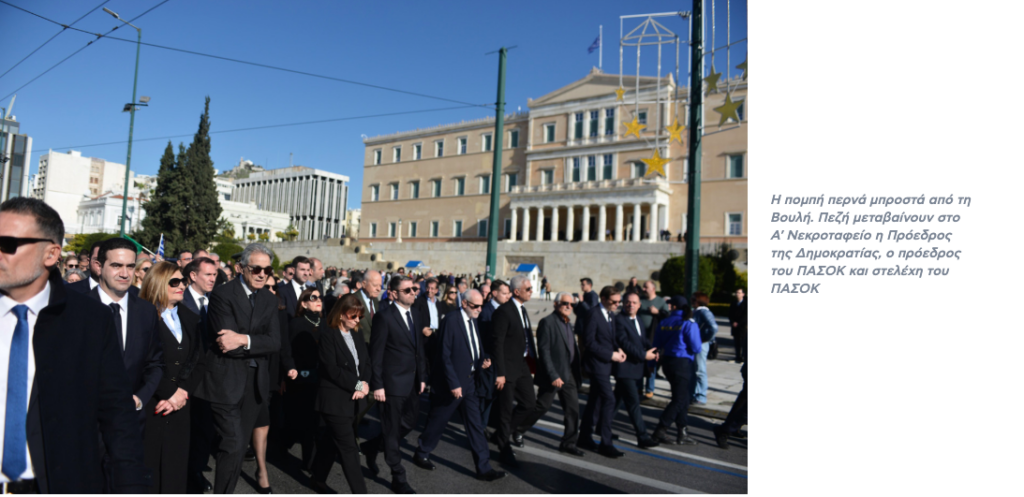




Eulogies for Kostas Simitis Concluded
The farewell speeches for Kostas Simitis have now come to an end.
Those who spoke honored not only a prominent political figure but also a leader whose vision and commitment shaped modern Greece. They highlighted his unwavering dedication to democratic governance, European integration, and social progress.
Each eulogy reflected on Simitis’ remarkable legacy, emphasizing how he combined personal integrity with political action. His life was devoted to bringing Greece forward, making lasting contributions in critical areas such as the economy, infrastructure, and public institutions.
Amid profound respect and emotion, Greece bid farewell to one of its great statesmen, whose impact on the nation will endure in history.
Konstantinos Tsoukalas: Simitis Was Deeply Committed to Improving Greece
Kostas Simitis did everything possible to turn politics into a profession.
He was intensely focused on the need to improve Greece, driven by the profound belief that democratic Greece must act within the European framework—not by clinging to the past but by looking toward the future.
His convictions were unwavering, which is why he left nothing to chance. Perhaps because luck lacks rules and is often unfair, Simitis sought to rationally shape and influence the outcomes that luck might bring.
He couldn’t have imagined that in Agioi Theodoroi, in his house overlooking the sea—the sea he loved so much—what he would last see was that very horizon he cherished.
Konstantinos Tsoukalas: Farewell to an Entire Era
There is one thing I remember with precision—when I first met you, Konstantine—allow me to call you Kostas, as I first knew you—my close friend Konstantinos Poulantzas came to find me and said, “Come, we’re going to play football, and you’ll meet an exceptional guy, Kostas Simitis.”
And so we played football at Dexamenis Square, and that’s how I started socializing with Kostas Simitis.
It was the beginning of something that seemed to lead nowhere. No one could have imagined that this newly forming group would dissolve in such a strange way.
Poulantzas tragically took his own life in my home, Simitis became prime minister, and here I am, after 50–60 years, bidding farewell not only to him but to an entire era and a world that no longer exists.
Yiannis Voulgaris: Simitis Followed a Personal Code of Conduct
He radiated personal dignity and integrity, qualities further strengthened by his life partner.
These values were instilled in their daughters as well.
We address him with respect so that his example of determination continues to inspire us.
Simitis now engages in dialogue with history.
Yiannis Voulgaris: Simitis was chosen because he was ready for the leap
At critical junctures, Greece’s great leaders stood out. This is how modern Greece moved forward and achieved much, despite setbacks and compromises.
Simitis responded consistently to major challenges, securing an important place among Greece’s leaders, even while being scorned by populist voices.
He did the work and then withdrew, intervening only at crucial moments on major issues, maintaining the role of a true statesman.
Kostas Simitis was also a European politician who contributed significantly to Europe’s development. Today, major international media and prominent global figures commemorate him.
Let us not forget that in 2004, under Greece’s presidency and the leadership of Kostas Simitis, Europe came together again in the marketplace of ideas after the Second World War.
He served his role without concessions, experiencing politics as an adventure that transcended circumstances and the immediate concerns of the moment.
Yiannis Voulgaris: History has already spoken about Kostas Simitis’s great contributions
In 2004, he handed over a Greece better than the one he had inherited.
Kostas Simitis experienced politics as a gamble. A child of left-wing parents, he lived through the turbulent period of the civil war. When reality adjusted expectations to what was feasible, Simitis did not yield. He served PASOK until the end of his life.
“I was a co-founder,” he would remind Andreas Papandreou during moments of tension.
Simitis’s eight-year term was more than just a period of PASOK governance. It was society itself that brought him to the forefront of PASOK.
Tasos Giannitsis: The Final Farewell
I will remember you for our informal meetings, for the human moments, for your support.
Safe journey — Greece mourns your loss.
Safe journey, Konstantinos, we bid you farewell with gratitude.
Tasos Giannitsis: Simitis put the country above himself
From 1996, when he assumed office as Prime Minister, he created a spirit of modernization.
It reflected a comprehensive mindset that he embodied through his behavior, actions, and vision.
All of this contributed to building Greece’s weight on the international stage, such as its entry into the Eurozone and Cyprus’s European trajectory.
Beyond the honor we owe to him personally, we are here to support his beloved family. This is the family from whom we took many years of their loved one, and we must now honor them.
Tasos Giannitsis: To a man who proved his bravery with deeds, honors must be given through deeds
The presence of the entire political spectrum demonstrates the magnitude of the honor for Kostas Simitis.
He made us proud, he gave us substance. He dedicated his life to taking Greece much higher. And he succeeded.
He understood that Greece’s position in Europe depended on understanding the pulse of the times and conveying it to his party and society. And he succeeded.
He always moved forward, often at personal and political cost. He was a rare personality shaped by his parents, the turbulent years of the dictatorship, the progress of European countries while we were under oppression, and his faith in PASOK.
Androulakis: Simitis was the political antidote to the arrogance of power
You walked through life with a rare political ethos in your public presence. Always present in the great battles of our Movement. Your integrity, institutionalism, and methodical approach made history. You now belong to the Pantheon of great European leaders. At a time when liberal democracy and social cohesion are threatened, social-democratic politicians like you are beacons for all of us who share the same political beliefs.
In your personal life, too, you were a model of humility and simplicity. Always discreet, without fanfare and moralizing. You were the political antidote to the arrogance of power.
You showed us that many things that seem impossible are within our grasp. That a different path, counter to conservatism, is achievable: This progressive patriotism was what you served throughout your journey. Today, Greece bows down to one of the greatest leaders in its modern history. Eternal be your memory.
Androulakis: The Legacy of Simitis
The most important legacy that Kostas Simitis leaves behind is the vision for ongoing social convergence with the most developed European countries. He deeply believed that Greece was not doomed to lag behind.
Let us imagine how our country would have been without major infrastructure projects such as the Rio-Antirrio Bridge, the Egnatia Road, the Metro, the Attiki Odos, the “Eleftherios Venizelos” airport, and many others.
His priorities were firmly placed on a strong welfare state, support for the working people, and prudent fiscal policy.
He breathed life into public universities, supported public health with the establishment of 11 new hospitals, and implemented permanent social interventions such as EKAS (Social Solidarity Benefit) and Help at Home. He promoted the institutional modernization of the state and public administration, with the constitutional establishment of independent authorities, the creation of Citizen Service Centers (KEP), and the advancement of numerous reforms that improved the lives of citizens.
Because, ultimately, real progressive modernization is comprehensive. It doesn’t just mean economic progress; it also means strengthening institutions and respecting human rights, upgrading—not downgrading—the state of justice. It means transparency and accountability in decision-making, fair distribution of development gains, and not widening inequalities.
Real modernization means a fairer tax system that supports the working people. It involves utilizing European funds for regional development and not for favouritism appropriation by powerful interests. This is the legacy of Kostas Simitis, a legacy that remains an ongoing social necessity and the political compass of our Movement.
Androulakis: “The Achievements of Simitis’ Government Are Milestones in the Country’s History”
The politician, who spoke little but planned and acted a lot, united hands with the Greek people on the path of convergence with the most developed economies in Europe. The achievements of his government are milestones in the history of the country. Greece’s entry into the Euro and Cyprus’ accession to the European Union, despite the unresolved Cyprus issue, are key examples.
I truly want you to reflect on the consequences that Hellenism would have faced from Turkish ambitions to partition the island if this visionary leader had not planned this great national success. Kostas Simitis was a co-creator of History, not a mere follower of it. He was an equal interlocutor with the strongest leaders, gaining their trust with his reliability and realism. He expressed a distinct opinion based on his own “beliefs,” as he fought for an independent “Europe of the peoples,” even opposing the American invasion of Iraq. In 2004, he left Greece more optimistic and stronger than ever. The successful preparation for the Olympic Games was proof that when a country has leadership with a plan, it can bring out its best.
Androulakis: “Kostas Simitis Was the Most Suitable Leader in an Era of Rapid Change”
The citizen in this process must have VALUE and be a PARTICIPANT. Otherwise, no reform will endure in the long term. The importance of these positions was demonstrated during the economic crisis. A crisis, of course, which you had boldly warned about from the podium of Parliament in 2008.
The work of the PASOK governments during the period 1996-2004 is linked to one of the most creative periods in modern Greece.
Kostas Simitis was the most suitable leader in an era of rapid changes and immense challenges: European integration had entered an irreversible course, while increasing globalization required a well-developed adaptation plan from national states to prevent their societies from sinking into decline.
Androulakis: “Simitis Believed No Reform Is Politically Neutral”
Through creative disruptions, often going against the current, you brought to life the Greece of national confidence, social justice, and extroversion.
You fought for these values from the post-civil war years, during the junta, and later in the post-dictatorship era through PASOK. You rallied a large social majority around the political vision of modernization. However, you clearly gave it progressive content, as evidenced by your work, long before the words lost their true meaning.
You maintained that no reform is politically neutral. As a “leftist with social-democratic ideas,” as you self-identified, you believed that implementing modernization was not merely a technocratic process but required mobilization and social struggle.
Androulakis: “Greece Honors the Prime Minister Who Defined the Post-Dictatorship History of the Country”
PASOK bids farewell to its second historical leader, after Andreas Papandreou.
The political world has become poorer, having lost a significant international personality who enriched public dialogue with creative and reasoned contributions.
With deep emotion, I remember the small booklet you gave me in one of our first conversations.
A publication from the Alexander Papannastasiou Group, which you founded with other concerned democratic fighters in your youth.
You made me a part of your political thought and the ideals with which you always fought against conservatism and fatalism. Anyone who reads that text will realize that your battles were not tactical.
You had identified early on the historical roots of the state’s pathologies and had formulated a political vision for overcoming them. That’s why your struggle against clientelism, stereotypes, and the entrenched systems that paralyzed society and democracy was continuous.
Mitsotakis: “Simitis Said That a Government Exists Not to Perpetuate Its Power”
He believed that the government should assist society by seeking broad consensus, often going against the tide when necessary. Therefore, we must not hesitate in the face of obstacles, always aiming for progress.
It is hard to disagree with Kostas Simitis when his vision reflected the country’s effort to rid itself of burdens from the past.
Mitsotakis: “We Bid Farewell to a Twice-Elected Prime Minister, Whom My Institutional Role Requires Me to Honor”
A champion of democracy, Kostas Simitis now belongs to history, which will assess his eventful political journey.
Three enduring legacies stand out: his unwavering faith in the European orientation of Greece, his governance style exemplified by the famous notebook, where policy declarations were methodically recorded and realized—an example of how much importance a leader should place on effectiveness.
The third aspect was that of a politician who, alongside his political duties, found time to read and attend the theater. He truly cherished his role as a husband and father.
Sakellaropoulou: Simitis’s Eight-Year Term Brought Significant Achievements
It was marked by defining moments that shaped the country’s course and stand out as remarkable accomplishments. He was calm, modest, self-sufficient, and had a deep love for culture and the arts.
He was devoted to his wife and daughters. Testimonies highlight how much he will be missed, but his example will remain alive as a lasting legacy.
Sakellaropoulou: Kostas Simitis Defended Democracy and Its Principles with Passion and Reason
With a primary focus on modernization, he introduced a political approach emphasizing planning and low-profile, systematic work, steering clear of populist shortcuts.
He communicated with moderation, measured speech, and democratic ethics. His modernization agenda was a continuous reformist challenge.


From right to left: The President of the Hellenic Republic, Katerina Sakellaropoulou; the President of Cyprus, Nikos Christodoulides; Prime Minister Kyriakos Mitsotakis with his wife, Mareva Grabovski-Mitsotakis; the Speaker of the Hellenic Parliament, Konstantinos Tasoulas; the Speaker of the Cypriot Parliament, Annita Demetriou; PASOK President Nikos Androulakis; SYRIZA President Sokratis Famellos; the parliamentary representative of the Communist Party of Greece (KKE), Thanasis Pafilis; and the President of New Left, Alexis Charitsis.
After the funeral service, Kostas Simitis’s body will be taken by a hearse, which will transport it to the First Cemetery of Athens.
Following the hearse will be two cars carrying members of his family, while four senior officers will pay tribute without holding ribbons.


PASOK MP Katerina Spyridaki fainted inside the Metropolitan Cathedral.
Her colleague from PASOK, Stefanos Parastatidis, provided her with first aid.


The final farewell to Kostas Simitis
The Metropolitan Cathedral of Athens is filled for the farewell to Kostas Simitis.

With the arrival of President Sakellaropoulou, the arrival of the dignitaries was completed, and the funeral service for Kostas Simitis began.
Katerina Sakellaropoulou offered her condolences to Daphne Simitis and paid her respects to Kostas Simitis with a touch on his coffin.



At 11:58, President of the Hellenic Republic, Katerina Sakellaropoulou, arrived.
Athens Mayor Haris Doukas, who arrived earlier at the Cathedral, was also present.
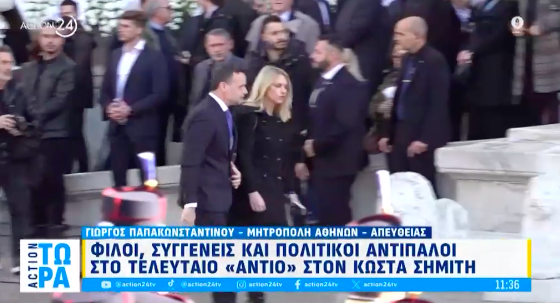
The Prime Minister expressed his condolences to Daphne Simitis with a handshake before taking his place to the left of the coffin with the body of Kostas Simitis.
The gathered crowd has filled Mitropoleos Street up to Syntagma Square.
Ten minutes before noon, Prime Minister Kyriakos Mitsotakis arrived at the Cathedral, accompanied by his wife, Mareva Grabofski-Mitsotakis.


The arrival of PASOK President Nikos Androulakis was met with applause from the gathered crowd.
Nikos Androulakis offered his condolences to the wife of Kostas Simitis, Daphne.

Evangelos Apostolakis and Michalis Sallas are at the Metropolitan Cathedral.
Present at Kostas Simitis’ farewell is also the U.S. Ambassador to Greece, George Tsunis.
From left to right: Giorgos Papachristos, Yiannis Pretenderis, Chara Kefalidou, Kostas Laliotis, Loukas Tsoukalis, and Kostas Skandalidis.
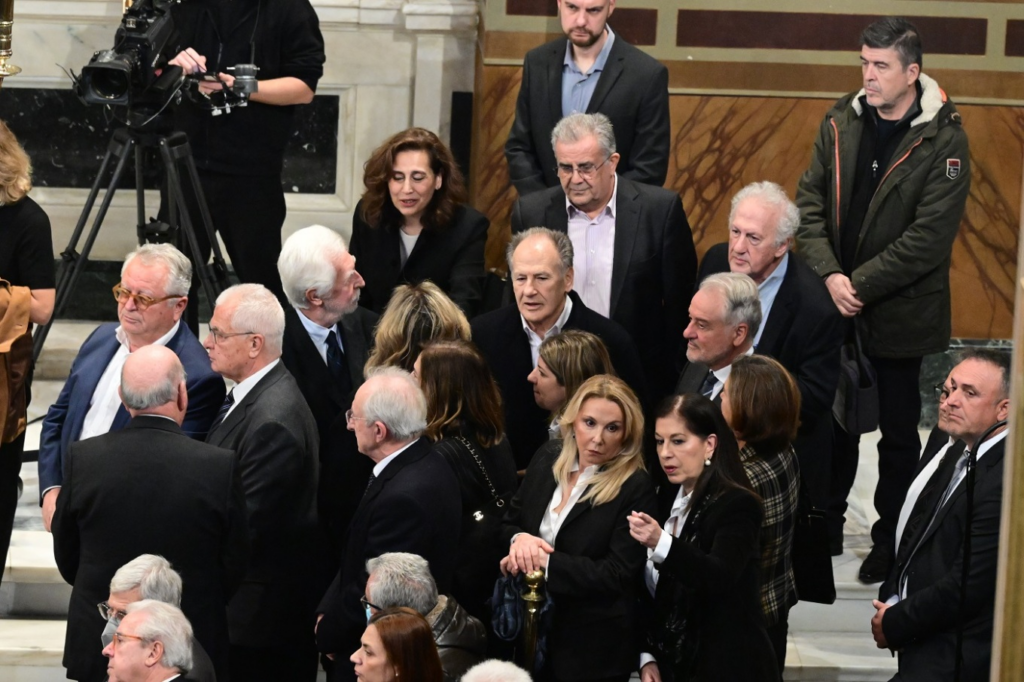

Daphne Simitis (right) with her daughters at the Cathedral

Representing SYRIZA, Olga Gerovasili, Nikos Pappas, Giorgos Karameros, and Mariliza Xenogiannakopoulou arrived at the Cathedral.
The Minister of Citizen Protection, Michalis Chrysochoidis, followed by former minister Tasos Giannitsis

Former minister Christos Verelis makes statements about Kostas Simitis
The family of Kostas Simitis stands by the former Prime Minister’s coffin

The moment Kostas Simitis’ body enters the Cathedral




Kostas Simitis’ body, covered with the Greek flag, has arrived at the Metropolitan Cathedral, where it was received by his wife, Daphne, and their two daughters.
Former PASOK President and Minister Evangelos Venizelos Arrives at the Metropolitan Cathedral

At 11:00 a.m., the PASOK parliamentary group, the Political Council, and the party’s Political Center will gather on Amalias Avenue, outside the Parliament, to proceed together to the Metropolitan Cathedral.

Burial at Athens First Cemetery
Following the conclusion of the funeral service, the body will be transported by hearse to Athens’ First Cemetery. Two cars carrying family members will follow, while four senior officers will pay tribute without carrying ribbons. Kostas Simitis will be buried next to Andreas Papandreou and near Melina Mercouri, with honors rendered by guards from all three branches of the Armed Forces.
Former Minister Tassos Giannitsis, who will deliver a eulogy for Kostas Simitis.

“Farewell,” – A Video Tribute to Kostas Simitis by Nikos Androulakis
“There is no end to history. Today continues into tomorrow. The continuation depends on us.”
Among the first to arrive at the Metropolitan Cathedral was Professor Emeritus Konstantinos Tsoukalas, who will deliver a eulogy for Kostas Simitis (seen on the right in the image wearing a trench coat)
Also arriving early at the cathedral was Thanasis Filippopoulos, who had long served as Kostas Simitis’ head of security (seen on the left in the image).
Kostas Simitis’ funeral will be conducted with the honors of a sitting prime minister. The ceremonial protocol and eulogies have been carefully planned for the occasion.
On the right side of the front row in the Metropolitan Cathedral will be the late prime minister’s wife, Daphne, and his daughters, Fiona (accompanied by her husband Pavlos Mouzakitis and Kostas Simitis’ granddaughter, Yolanda) and Marinela. Next to them will be relatives, friends of the former prime minister, and PASOK officials.


On the left side, among others, will be the President of the Hellenic Republic, Katerina Sakellaropoulou, the President of the Republic of Cyprus, Nikos Christodoulides, Prime Minister Kyriakos Mitsotakis, the Speaker of the House of Representatives of Cyprus, Annita Demetriou, PASOK leader Nikos Androulakis, SYRIZA leader Sokratis Famellos, the leader of New Left, Alexis Haritsis, former Prime Minister George Papandreou, Evangelos Venizelos, ten government ministers, the country’s military leadership, Deputy Governor of Attica Christina Kefalogianni, and the Mayor of Athens, Haris Doukas.

The funeral will take place with the honors of a sitting prime minister. The body of the former prime minister is expected to arrive at the Metropolitan Cathedral of Athens at 11:00 a.m. The service, officiated by Archbishop Ieronymos, will begin at noon. Several eulogies will follow, delivered by President Katerina Sakellaropoulou, Prime Minister Kyriakos Mitsotakis, PASOK leader Nikos Androulakis, three of Simitis’ close friends, former minister and academic Tassos Giannitsis, and professors Konstantinos Tsoukalas and Yiannis Voulgaris.

According to protocol, the family will be the first to enter the cathedral at around 11:00 a.m., followed by the arrival of the opposition leader, political leaders, ambassadors, and other officials, with the President of the Republic arriving last.

Live coverage of the farewell to Kostas Simitis will be provided by protothema.gr, with commentary from Stefanos Tzanakis and Grigoris Tsiovaras.

Traffic regulations will be in place in central Athens due to the funeral of Kostas Simitis.

Ask me anything
Explore related questions

